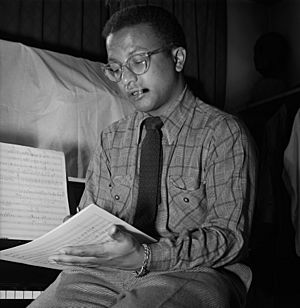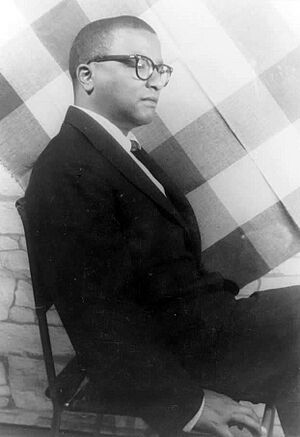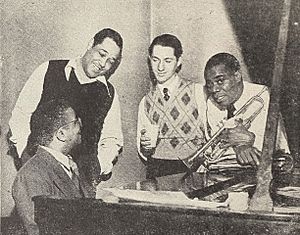Billy Strayhorn facts for kids
Quick facts for kids
Billy Strayhorn
|
|
|---|---|

Photo by William P. Gottlieb, c. 1947
|
|
| Background information | |
| Birth name | William Thomas Strayhorn |
| Born | November 29, 1915 Dayton, Ohio, U.S. |
| Died | May 31, 1967 (aged 51) New York, New York, U.S. |
| Genres | Jazz, swing, classical |
| Occupation(s) |
|
| Instruments | Piano |
| Years active | 1934–1964 |
| Labels | United Artists, Felsted, Mercer |
| Associated acts | Duke Ellington |
William Thomas Strayhorn (born November 29, 1915 – died May 31, 1967) was an American jazz composer, pianist, lyricist, and arranger. He worked closely with the famous bandleader and composer Duke Ellington for almost 30 years. Some of his most well-known songs include "Take the 'A' Train", "Chelsea Bridge", and "Lush Life".
Contents
Early Life and Musical Start
Strayhorn was born in Dayton, Ohio, in the United States. His family soon moved to Homewood in Pittsburgh, Pennsylvania. He also spent a lot of his childhood at his grandparents' home in Hillsborough, North Carolina. Strayhorn said his grandmother was a big influence on him when he was young. He became interested in music while living with her, playing hymns on her piano and listening to records.
When he returned to Pittsburgh, he worked hard to buy his first piano. He took music lessons and attended Westinghouse High School. There, he played in the school band and studied under Carl McVicker. He also studied classical music for a while. In his teens, he wrote songs like "Life Is Lonely" (which later became "Lush Life") and "Something to Live For". By age 19, he was writing music for a professional show.
Even though he loved classical music, it was very hard for Black musicians to become classical composers back then. So, Strayhorn discovered jazz music and decided to focus on that. He joined a jazz group called the Mad Hatters in Pittsburgh.
Meeting Duke Ellington
Strayhorn met Duke Ellington in December 1938 after an Ellington concert in Pittsburgh. Strayhorn showed Ellington how he would have arranged one of Duke's own songs. Ellington was very impressed and invited Strayhorn to meet him in New York.
Strayhorn then worked with Ellington for the next 25 years. He was an arranger, composer, and sometimes played piano for the band. Ellington once said, "Billy Strayhorn was my right arm, my left arm, all the eyes in the back of my head, my brain waves in his head, and his in mine." This shows how important Strayhorn was to Ellington.
Working with Ellington
Strayhorn and Ellington had a special partnership. Strayhorn was a very talented composer and arranger. He often worked behind the scenes, helping Ellington create amazing music. Ellington sometimes joked that Strayhorn did a lot of the work, but he got to take the bows.
Strayhorn wrote "Take the 'A' Train", which became the Duke Ellington Orchestra's most famous theme song. He also wrote other well-known pieces like "Lotus Blossom" and "Chelsea Bridge". Sometimes, his songs were credited to him alone, and sometimes they were listed as collaborations with Ellington. For some songs, like "Satin Doll", Ellington was credited alone.
Strayhorn also helped Ellington with bigger musical works like Such Sweet Thunder and The Far East Suite. They worked very closely on these projects. Strayhorn often played piano with the Ellington Orchestra during live shows and recordings.
In 1959, Strayhorn and Ellington created the music for the Hollywood film Anatomy of a Murder. This was a very important moment because it was one of the first times Black musicians created all the main music for a major Hollywood film. Their music helped change how jazz was used in movies.
In 1960, they worked together on the album The Nutcracker Suite. They took the famous classical music by Tchaikovsky and turned it into jazz.
Personal Life
Strayhorn was a very private person. He was also openly gay. He cared deeply about civil rights. He was a good friend to Martin Luther King Jr.. In 1963, he arranged and conducted "King Fit the Battle of Alabama" for Ellington's album My People, which was dedicated to King.
Strayhorn also had a big impact on the singer Lena Horne. He helped her improve her singing. They even recorded songs together. For a few years in the 1950s, Strayhorn left Ellington to work on his own projects. He released some solo albums and worked on theater productions.
Illness and Death

In 1964, Billy Strayhorn was diagnosed with esophageal cancer. He passed away on May 31, 1967.
While he was in the hospital, he gave Ellington his last song, "Blood Count". Ellington used this song on his memorial album for Strayhorn, called …And His Mother Called Him Bill. The last song on the album is a spontaneous piano solo of "Lotus Blossom" played by Ellington, showing his deep respect and love for his friend.
Legacy
Billy Strayhorn's accomplishments are remembered in several ways. A historical marker in Pittsburgh is placed at Westinghouse High School, where he studied. Another marker in Hillsborough, North Carolina, honors his childhood home.
The former Regent Theatre in Pittsburgh was renamed the Kelly Strayhorn Theater in 2000. It honors Strayhorn and another famous Pittsburgher, Gene Kelly. It is now a community theater for performing arts.
In 2015, Strayhorn was recognized in the Legacy Walk, which honors important LGBT individuals.
Duke Ellington often spoke about what he called Strayhorn's "four major moral freedoms":
- Freedom from hate
- Freedom from feeling sorry for himself
- Freedom from fear of helping others
- Freedom from thinking he was better than anyone else
Discography
For albums where Strayhorn arranged or performed with the Duke Ellington Orchestra see Duke Ellington discography
As leader/co-leader
- Billy Strayhorn !!!Live!!! (Roulette, 1958) – live
- Cue for Saxophone (Felsted, 1959)
- The Peaceful Side (United Artists, 1963) – recorded in 1961
- Great Times! with Duke Ellington (Mercer, 1964) – recorded in 1950
- Lush Life (Red Baron, 1992)
As arranger
- Johnny Hodges with Billy Strayhorn and the Orchestra (Verve, 1962) – recorded in 1961
As sideman
With Johnny Hodges
- Castle Rock (Norgran, 1955) – recorded in 1951
- Creamy (Norgran, 1955)
- Ellingtonia '56 (Norgran, 1956)
- Duke's in Bed (Verve, 1956)
- The Big Sound (Verve, 1957)
- Blues-a-Plenty (Verve, 1958)
- Not So Dukish (Verve, 1958)
With Joya Sherrill
- Joya Sherrill Sings Duke (20th Century Fox, 1965)
With Ben Webster
- Music for Loving (Norgran, 1954)
See also
 In Spanish: Billy Strayhorn para niños
In Spanish: Billy Strayhorn para niños
- List of jazz musicians
- List of jazz standards
 | Janet Taylor Pickett |
 | Synthia Saint James |
 | Howardena Pindell |
 | Faith Ringgold |


